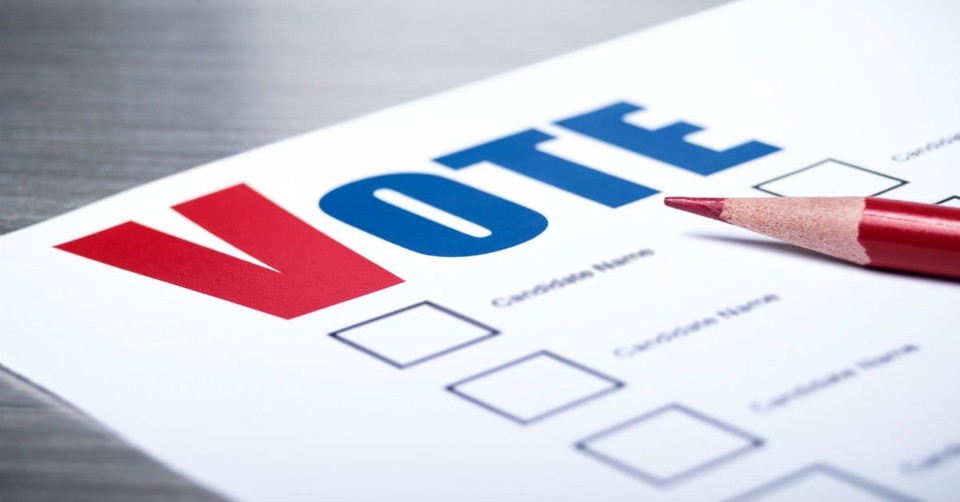10 Reasons You Should Vote with Your Faith

PRINCIPAL PRINCIPLES
It is easy to say, “My Christian faith determines my priorities when it comes to voting.” But what does that mean? How does that work? We offer the following, knowing that you may want to reorder this list or just create your own. Either way, start with principles and then move to political choices (and then double-check the choices to make sure they are consistent with your principles).
1. The Bible gives guidance.
The Bible is God’s inspired and authoritative Word and is therefore our rule for faith and practice, including political practices and votes.
2. Our highest loyalty goes to Jesus.
Jesus Christ is our Savior and Lord. Our highest loyalty as Christians is as followers of Jesus. Our commit- ment to Jesus is ahead of our commitment to our country, our families, ourselves, and all others.
3. God created his image in everyone.
The image of God is created into every human being from conception until death and into eternity. Therefore we must always treat every person and support policies with recognition of God’s image and with dignity and respect that honors God.
4. Love God and neighbor.
As followers of Jesus we believe that “God so loved the world that he gave his one and only Son, that who- ever believes in him shall not perish but have eternal life” (John 3:16).
We are called by Jesus to love God and others as God loves us. Jesus said, “‘Love the Lord your God with all your heart and with all your soul and with all your mind.’ This is the first and greatest commandment. And the second is like it: ‘Love your neighbor as yourself’” (Matt. 22:37–39). Jesus gave special attention to our neighbors who are most vulnerable and suffering.
5. Sin pervades our world and politics.
Don’t be surprised by sin—it’s everywhere. Sin is everything contrary to divine law. It is anything that is wrong rather than right. The premise of the gospel is that we are all sinners and that Jesus came to save us from all the sin in our world and in our lives, and from all the present and eternal consequences of human sin. So when sin shows up in politics and government, we are not surprised but we are reminded why we need and believe in the good news of Jesus Christ. Christians are not called to despair, but to be agents of God and “salt and light” in our world so that others “may see your good deeds and praise your Father in heaven” (Matt. 5:13–16).
6. Choose justice, mercy, and humility.
God has called us to turn right beliefs into righteous actions. The prophet Micah in the eighth century BC gave a profound answer to a top question: “He has showed you, O man, what is good. And what does the Lord require of you? To act justly and to love mercy and to walk humbly with your God” (Mic. 6:8).
7. Uphold the standard of righteousness.
Righteousness is an eternal attribute of God. When righteousness is our standard, we seek to do everything God’s way. The difference between right and wrong is not determined by public opinion, human culture, or personal preference. Our standard is summarized in 1 Peter 3:6: “Do what is right and do not give way to fear.”
8. Pursue the common good for all.
Christians have long shown compassion for others, following the teaching of Jesus in the parable of the good Samaritan that calls his followers to “Go and do likewise” (Luke 10:37) to others as the Samaritan did for the man who was mugged. While the ethical concept of common good has sometimes been abused, the Christian principle is to seek the best for everyone and not just for ourselves.
9. Trust God no matter what.
Christians have often been persecuted and even martyred without experiencing the outcomes for which they have prayed and lived. As those who truly believe that “in all things God works for the good of those who love him, who have been called according to his purpose” (Rom. 8:28), we are committed to trust God even when politics seem to be going in the wrong direction.
10. Be responsible.
Whether Christian or non-Christian, ethicists teach that morality and responsibility go hand in hand. We must not only believe what is right and know what is good; we are also responsible to use our God-given resources to do what is right and good. “Anyone, then, who knows the good he ought to do and doesn’t do it, it is sin for them” (James 4:17). We abandon our personal responsibility with the expectation that others will do that which is good on our behalf. This extends to paying taxes, voting in elections, and helping the poor and vulnerable. None of us can do everything, but we are responsible to do our part.
[Editor’s Note: This excerpt is taken from Faith in the Voting Booth by Leith Anderson and Galen Carey. © 2016 by Leith Anderson and Galen Carey. Used by permission of Zondervan. www.zondervan.com. All rights reserved.]
Leith Anderson serves as president of the National Association of Evangelicals. For thirty-five years he was the pastor of Wooddale Church in Eden Prairie, Minnesota. He is a graduate of both Denver Seminary and Fuller Theological Seminary. Anderson is the author of more than twenty books.
Galen Carey is Vice President, Government Relations, for the National Association of Evangelicals and is responsible for presenting the NAE before Congress, the White House, and the Courts. Before joining the NAE Staff, Carey was a longtime leader in World Relief, the relief and development arm of the NAE. Carey is a graduate of Trinity Evangelical Divinity School and McCormick Theological Seminary.
Publication date: March 15, 2016
Originally published March 15, 2016.





